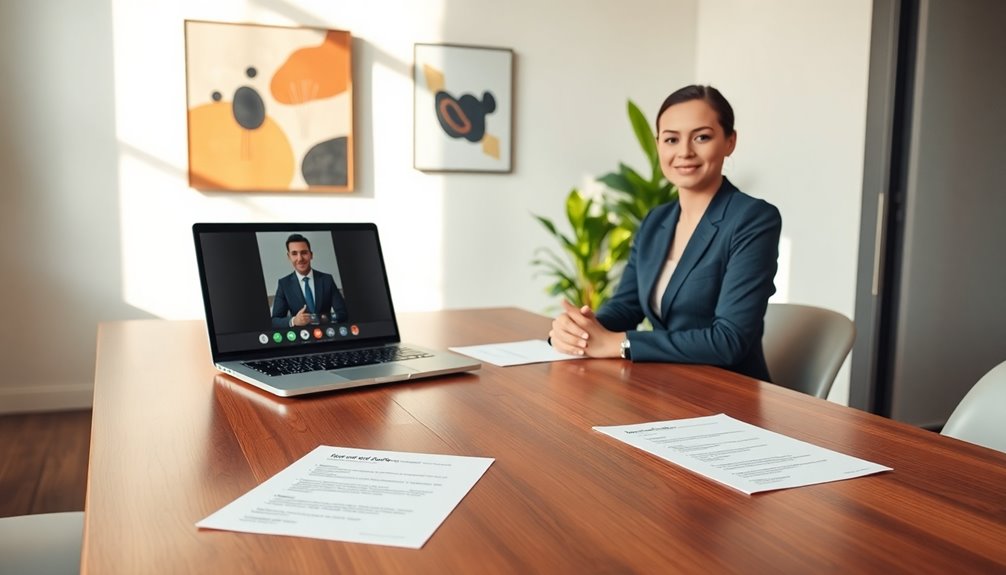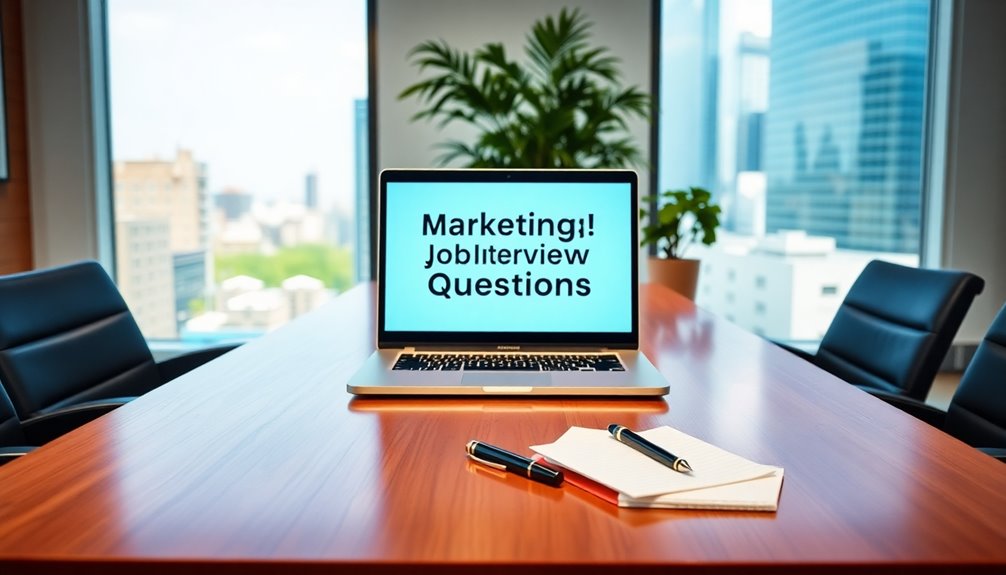Preparing for an internal job interview means showcasing your contributions and alignment with the new role. Start by clearly describing your current responsibilities and highlighting key achievements, like increasing team productivity or managing projects under budget. Discuss challenges you've overcome and your motivations for applying, emphasizing your excitement for the new position and commitment to the company's mission. Be ready to identify areas for improvement and desired training opportunities. Finally, express your preference for team dynamics that foster collaboration. There's always more to explore on perfecting your interview approach for success.
Key Takeaways
- Prepare specific examples using the STAR method to effectively demonstrate your achievements and problem-solving skills relevant to the new role.
- Highlight your alignment with the company's mission and culture, showcasing your commitment to mutual success and personal growth.
- Emphasize your key competencies, including leadership and emotional intelligence, to illustrate your readiness for the challenges of the new position.
- Ask insightful questions about team dynamics and training opportunities to express genuine interest and engagement during the interview.
- Reflect on your mentoring experiences and their impact on team performance, underscoring your ability to foster collaboration and drive success.
Current Role Description
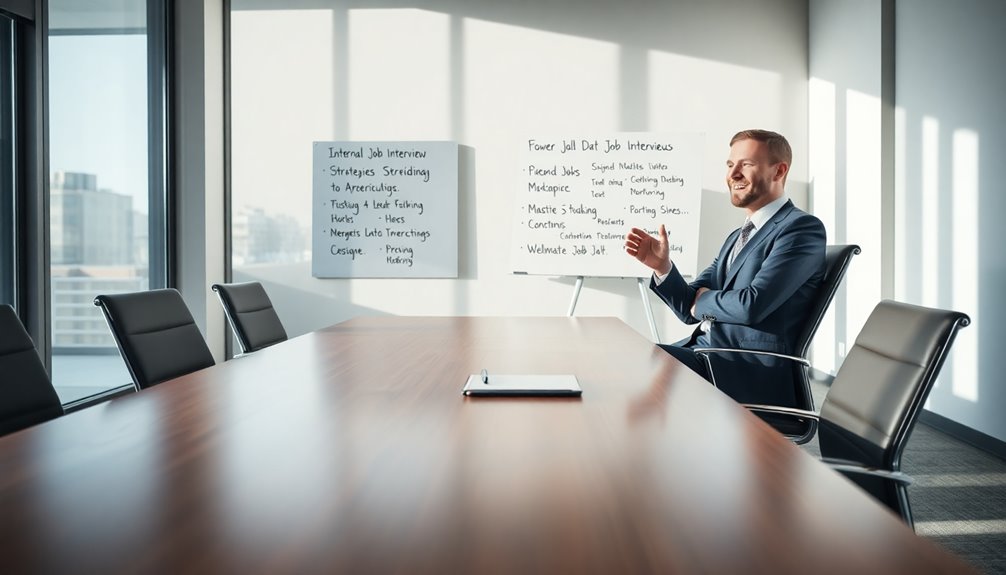
In your current role, you play a pivotal part in driving team objectives forward. When tackling internal interview questions, focus on the high-level contributions you've made rather than just your daily tasks. Highlight your skills and ability to initiate projects that align with the company's goals. Your experience within the organization has equipped you to face challenges head-on, and it's important to showcase how you've taken accountability for your actions and learned from those experiences.
Discuss your understanding of team dynamics and how your role supports overall success. For instance, if you've provided mentorship to colleagues, emphasize how this fosters collaboration and enhances team performance. Reflect on specific achievements that demonstrate your problem-solving capabilities, as these showcase your alignment with the company's values.
Finally, articulate your career aspirations clearly. Explain how they align with growth opportunities within the organization, reinforcing your commitment to both personal and team development. This approach not only answers internal interview questions effectively but also positions you as a valuable asset to the organization.
Key Achievements Highlight

Showcasing your key achievements during an internal interview can considerably strengthen your candidacy. By highlighting your contributions, you help interviewers see the value you bring to the team. For instance, if you've driven a 15% increase in team productivity through effective process improvements, make sure to mention it. Specific metrics, like completing a project 10% under budget, can illustrate your resource management and commitment to delivering results.
Accolades such as the Employee of the Month award for outstanding teamwork not only provide credibility but also demonstrate peer recognition of your efforts. Discussing initiatives you've led, like implementing a software tool that reduced project turnaround time by 20%, showcases your problem-solving skills and innovative thinking.
Don't forget to mention your role in mentoring colleagues, emphasizing how your support led to their promotions. This reflects your leadership qualities and dedication to team development. By presenting these key achievements clearly and confidently, you'll effectively position yourself as a strong candidate for the new role. Remember, the more specific and quantifiable your examples, the better they'll resonate with your interviewers. Additionally, highlighting your emotional intelligence can illustrate your ability to adapt and manage team dynamics effectively.
Handling Challenges
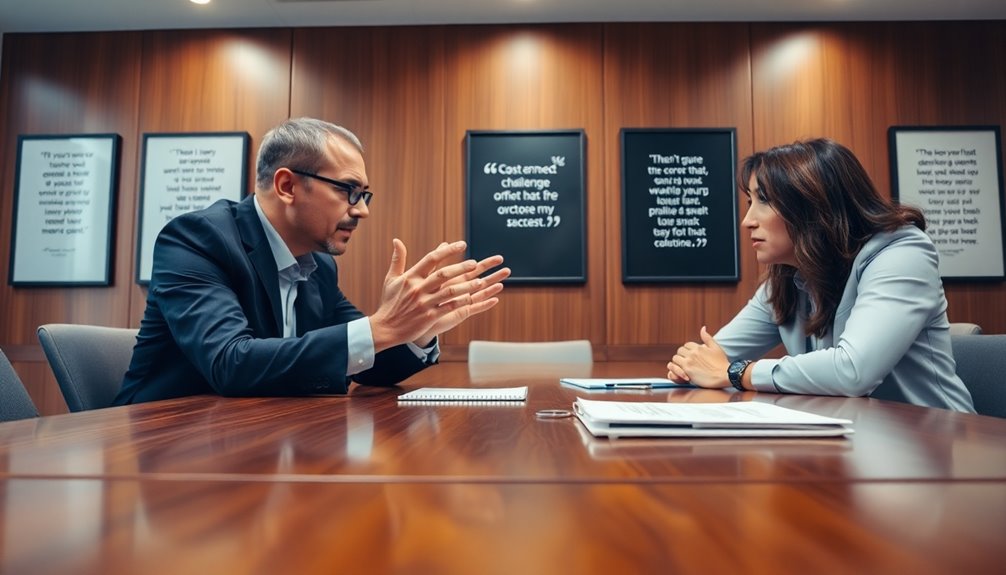
While maneuvering your current role, you've likely encountered various challenges that tested your skills and resilience. When discussing handling challenges during your internal job interview, it's vital to prepare specific examples that highlight your problem-solving skills. Think about a situation where you faced an obstacle and detail the context, actions taken, and the resolution process. This not only demonstrates your ability to tackle issues effectively but also showcases your adaptability and resilience.
Moreover, don't forget to reflect on the lessons learned from these experiences. Emphasizing personal growth shows that you can evolve in dynamic work environments. Highlighting teamwork is equally important; share instances where collaboration helped you and your colleagues overcome challenges. This illustrates your capability to leverage team strengths, which is often essential in many roles.
Finally, articulate how these past challenges equipped you with relevant skills that align with the expectations of the new position. By connecting your experiences with the requirements of the role, you present yourself as a well-prepared candidate ready to take on new responsibilities.
Motivations for Applying

Having effectively navigated challenges in your current role, it's time to focus on why you're enthusiastic to apply for the new position. Your motivations for applying stem from a strong alignment between the skills you've developed and the job requirements. You've gained valuable experience that positions you well for this new opportunity, allowing you to contribute even more to the company's growth and development.
As an internal candidate, you appreciate the importance of company culture and values. Your familiarity with the environment not only eases the shift but also enhances your ability to collaborate effectively with your colleagues. You're keen to continue building those relationships while taking on new responsibilities.
You also recognize the importance of personal growth opportunities. By pursuing this new role, you're not just seeking a title change; you're aiming to expand your skill set and embrace new challenges. This desire for advancement aligns with your career trajectory, showcasing your commitment to self-improvement and dedication to the company. Overall, your motivations reflect a blend of personal ambition and a desire to contribute positively to the organization's future.
Excitement for New Role

When you express genuine excitement for the new role, it shows your commitment to the company's goals. Think about specific reasons that spark your enthusiasm, like opportunities for growth or how the position aligns with your values. Highlighting these connections can make a strong impression on your interviewers.
Reasons for Enthusiasm
Many candidates express genuine enthusiasm for a new role by emphasizing how it aligns with their skills and career aspirations. This excitement can be contagious, resonating well with interviewers who appreciate candidates enthusiastic to contribute to the organization's goals. By showcasing your unique skills, you can illustrate how you'll enhance team dynamics and drive success within the new position.
Articulating a strong interest in specific projects or initiatives can also demonstrate your proactive mindset. Mentioning particular aspects of the role that excite you shows that you're not only focused on your own growth but also committed to the company's progress. This enthusiasm for collaboration and your keenness to leverage your insights will highlight your potential to positively impact the team.
Furthermore, discussing opportunities for professional development reassures interviewers of your commitment to continuous learning. By expressing your desire to grow and adapt within the role, you signal that you're forward-thinking and motivated. Overall, presenting these reasons for your enthusiasm can convincingly illustrate your fit for the new role, reinforcing your readiness to take on new challenges and contribute effectively to the team.
Alignment With Goals
Aligning your personal goals with the company's mission not only boosts your job satisfaction but also fosters a deeper sense of purpose in your new role. When you demonstrate a genuine interest in how your aspirations align with the company's objectives, you show hiring managers that you're not just looking for any position; you're committed to this specific role. This alignment signals strategic thinking, highlighting your proactive attitude.
During the interview, articulate a clear vision of how the responsibilities of the new role contribute both to your personal growth and the organization's success. By expressing enthusiasm for the challenges you'll face, you set yourself apart as a motivated candidate keen to contribute meaningfully.
Research recent company initiatives and connect them to your personal goals. This shows that you've invested time in understanding the company mission, making your case even stronger. Additionally, embracing positive thinking strategies can greatly enhance your approach to challenges and opportunities in the new role. Remember, it's not just about filling a position; it's about how your excitement and alignment with the company's vision can drive mutual success. In doing so, you're not only enhancing your chances of getting the job but also setting the stage for a fulfilling career path.
Professional Growth Plans

Crafting a professional growth plan is essential for both your career aspirations and your organization's strategic objectives. When you align your goals with those of your employer, you foster a mutually beneficial relationship. Here are key elements to reflect on while developing your plan:
- Self-assessment: Regularly evaluate your strengths and weaknesses to identify areas for improvement.
- Continuous learning: Commit to pursuing relevant certifications and attending workshops to enhance your skills.
- Mentorship programs: Engage with mentors who can provide valuable insights and guidance on steering your career path.
Relevant Skills Overview

When preparing for your internal job interview, it's essential to highlight key competencies that match the new role's requirements. You should focus on demonstrating how your skills align with the position, showcasing both what you've accomplished and how you can contribute moving forward. By clearly articulating your relevant skills, you'll strengthen your case for why you're the right fit for the job. Additionally, consider integrating your understanding of financial terms to better communicate your value in the context of the company's goals.
Key Competencies Highlighted
Key competencies play an essential role in internal job interviews, highlighting the skills that set candidates apart. By showcasing your strengths in specific areas, you can position yourself as the ideal candidate for the role. Here are some key competencies to focus on:
- Leadership skills: Demonstrating your ability to lead teams and inspire others is fundamental. Share examples of how you've motivated your colleagues to achieve common goals.
- Adaptability to change: Employers value candidates who can adjust to new circumstances. Illustrate how you've embraced change in your current role and thrived amidst challenges.
- Emotional intelligence: This involves understanding and managing your emotions and those of others. Highlight instances where you've navigated team dynamics or resolved conflicts effectively.
Additionally, strong problem-solving skills are essential. Be ready to discuss situations where you've overcome obstacles or improved processes. Finally, self-awareness is crucial; it allows you to reflect on your strengths and weaknesses, aligning your growth with the organization's objectives. Show how your familiarity with the company culture enhances your potential for success in the new role. Furthermore, having a solid understanding of software development life cycle (SDLC) can significantly improve your ability to contribute to team projects effectively.
Skills Alignment With Role
Identifying the right skills that align with the new role is essential for your success in an internal job interview. Skills alignment with the role requires you to assess both hard and soft skills pertinent to the job's requirements. Take time to highlight specific skills you've honed in your current position, such as project management, communication, and problem-solving.
Your experience working on relevant projects can greatly bolster your candidacy. By articulating how your technical knowledge and past contributions fit the new role, you demonstrate your value and readiness for the challenge. Candidates' self-awareness plays a vital role here; knowing not just your strengths but also underutilized skills can showcase your potential for growth and adaptability within the organization.
Prepare to discuss how these specific skills can be leveraged for greater impact in the new position. By aligning your existing abilities with the job's needs, you'll position yourself as a strong candidate ready to take on new responsibilities and contribute effectively to the team. This proactive approach will not only impress interviewers but also solidify your place within the company.
Adaptability to Change

Adaptability to change is like a compass in the ever-shifting landscape of the workplace. When you're preparing for internal interviews, showcasing your ability to adapt can set you apart in the hiring process. Employers look for candidates who thrive in dynamic environments and can pivot when necessary.
Consider the following points to highlight your adaptability:
- Resilience: Show how you've bounced back from challenges in your current position.
- Cognitive Flexibility: Discuss instances where you adjusted your approach to meet new demands or processes.
- Proactive Problem-Solving: Share examples of how you've anticipated changes and taken initiative to address them.
Research reveals that organizations with high adaptability levels are 2.5 times more likely to outperform competitors during changes. Furthermore, 92% of talent professionals consider adaptability a key skill in today's job market. By emphasizing your ability to adapt, you'll not only demonstrate your value but also align with the organization's goals. Remember, training programs aimed at enhancing adaptability can lead to increased engagement and reduced turnover, making this skill essential for both you and your employer. Additionally, incorporating mindfulness practices can further enhance your adaptability by promoting emotional well-being in the face of change.
Areas for Improvement

Identifying your skills gaps is essential for your growth, especially when preparing for internal interviews. You can enhance your interview techniques by seeking feedback and practicing responses to common questions. By focusing on these areas, you'll position yourself for success and align your strengths with your organization's needs. Additionally, incorporating stress management techniques can help you remain calm and focused during the interview process.
Identifying Skills Gaps
Recognizing skills gaps is essential for your professional growth and success in any role. By identifying skills gaps, you can assess your current competencies against the demands of your desired position, focusing on both technical and soft skills. Here are some effective strategies to help you:
- Conduct regular self-assessments to reflect on your strengths and weaknesses.
- Seek feedback from peers and supervisors during performance reviews to uncover areas needing improvement.
- Engage in professional development opportunities like workshops or mentorship programs to enhance your skills.
Utilizing performance reviews and competency frameworks can pinpoint specific skills that may be underdeveloped or underutilized in your current role. Once you identify these gaps, setting measurable goals for improvement is critical. For instance, aim to complete a relevant certification within a specific timeframe. Additionally, understanding how Intelligent Tutoring Systems (ITS) can provide personalized feedback may further aid in addressing your skills gaps. This structured approach not only addresses your skills gaps but also aligns with your professional aspirations. Ultimately, taking the initiative to identify and bridge these gaps will notably enhance your performance and prepare you for future opportunities within your organization.
Enhancing Interview Techniques
Enhancing your interview techniques can considerably boost your chances of landing the desired position. To improve your responses to common questions, focus on active listening and the STAR method. This approach showcases your ability to reflect on past experiences in a structured way. Researching your current job role and department beforehand demonstrates your genuine interest and preparedness.
Here's a quick reference table to guide your improvement:
| Technique | Action Steps |
|---|---|
| Active Listening | Pay close attention and clarify questions. |
| STAR Method | Use Situation, Task, Action, Result to structure answers. |
| Role Research | Understand the specific role and team dynamics. |
| Insightful Questions | Prepare questions about company culture. |
| Feedback | Seek input from colleagues post-mock interviews. |
Adopting a growth mindset is essential as you refine your communication style. Embrace feedback to identify areas for improvement. By focusing on these techniques, you'll enhance your ability to present yourself as the ideal candidate for the position you desire. Additionally, developing topical authority in your understanding of the role can further strengthen your interview responses.
Desired Training Opportunities
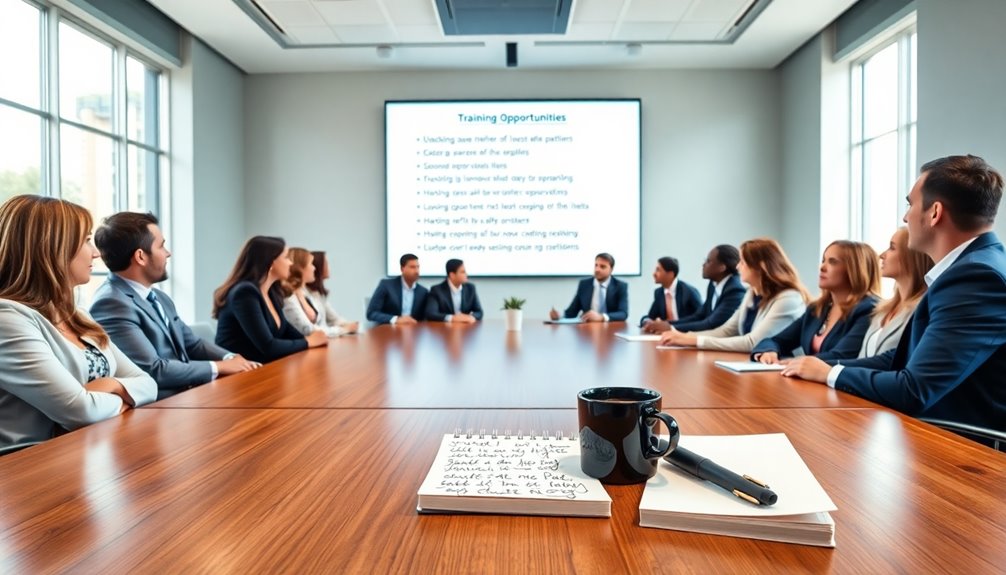
When evaluating desired training opportunities, it is essential to focus on programs that not only elevate your skills but also align with your career aspirations and the needs of your organization. Investing in training and development can lead to significant benefits, both for you and your employer. Companies that prioritize these initiatives often see a 24% increase in profit margins, showcasing the return on investment in employee growth.
Here are some valuable training opportunities to evaluate:
- Skill Enhancement Programs: Boost your expertise in specific areas relevant to your role.
- Leadership Development Courses: Prepare for future roles and responsibilities within the organization.
- Technical Certifications: Gain recognized qualifications that enhance your professional credibility.
Moreover, organizations that offer tailored training see a 70% increase in employee engagement and are 2.5 times more likely to retain top talent. By seeking out these opportunities, you're not just advancing your career; you're also demonstrating your commitment to your organization's success. Prioritizing professional development creates a culture of growth that benefits everyone involved.
Team Environment Preference

The ideal team environment can considerably impact your job satisfaction and overall productivity. When you think about your preferred team setup, consider whether you thrive in smaller groups that promote close collaboration or if you prefer larger teams that offer diverse perspectives and resources. Each structure has its advantages, and knowing your preference can help you articulate it during an interview.
Understanding team dynamics is essential; environments that prioritize open communication and mutual support lead to higher engagement and retention rates. Research shows that when your values align with the team's culture, you're more likely to experience job satisfaction. Cohesive teams not only reduce stress but also enhance overall productivity. Moreover, diversifying investments is essential for managing financial stability, which can also reflect the importance of a balanced and supportive team environment.
Moreover, adaptability is key. Being open to various team environments allows you to contribute effectively, no matter the situation. Whether you're in a fast-paced project team or a more structured department, your ability to thrive in different dynamics will showcase your value to the organization. As you prepare for your internal interview, reflect on these aspects, and be ready to discuss how your preferences align with the team environment you'll be joining.
Company Awareness and Fit
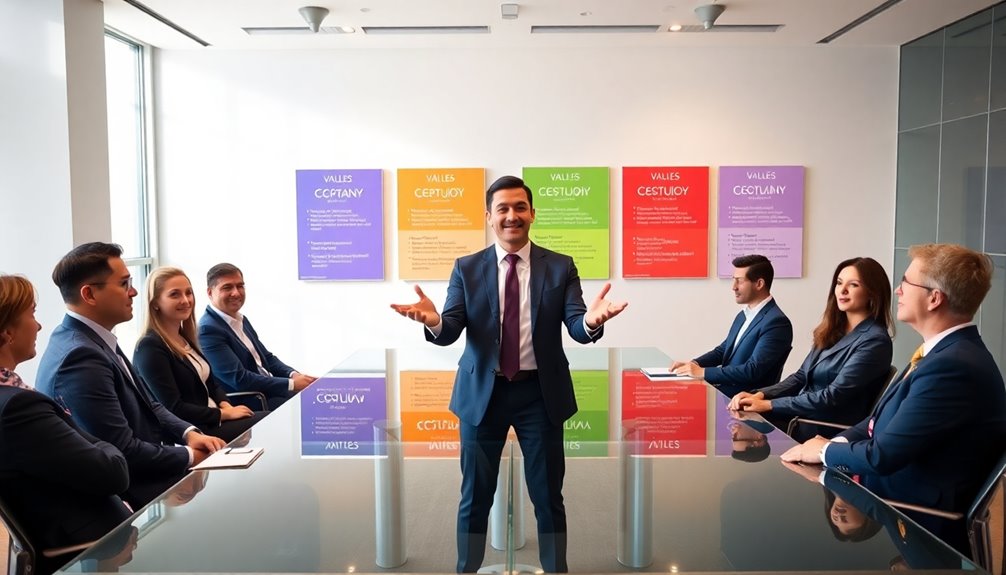
Demonstrating a strong awareness of your company's mission and values can considerably bolster your candidacy during an internal interview. When you show that you understand how your role aligns with organizational goals, you present yourself as a strategic fit. Here are a few key points to reflect upon:
- Familiarize yourself with recent company achievements and challenges to engage genuinely during discussions.
- Articulate how your skills and experiences support the company's strategic direction and address current needs.
- Understand team dynamics and cultural fit to enhance your appeal as a prospective internal hire.
Having solid company awareness not only helps you discuss your potential contributions but also showcases your commitment to the organization's future. Researching market positions and industry trends can provide valuable context, allowing you to highlight how your work can positively impact the team and the company. Remember, alignment with the company's values and mission signals that you're not just looking for a job but are invested in the organization's success. This level of insight can set you apart from other candidates and demonstrate that you're ready to take on new challenges.
Frequently Asked Questions
How to Answer Why You Are Interested in an Internal Position?
When you're asked why you're interested in an internal position, think about how your goals align with the company's mission. You can highlight past contributions that show your readiness for this new role. Share your career aspirations and how this position fits into your long-term plans. Emphasize your understanding of team dynamics and your enthusiasm to tackle new challenges, showcasing how this role can help you grow while benefiting the company.
What Are the Top 5 Questions to Ask an Internal Interview?
When you're preparing for an internal interview, consider asking about the specific challenges of the new role. You might also inquire about team dynamics to see how you'll fit in. Don't forget to ask about the strategic goals for the department—this shows you're aligned with the company's vision. Seeking feedback on your current performance can help identify areas for growth, and asking about professional development opportunities demonstrates your commitment to advancement.
How Do You Sell Yourself in an Internal Interview?
You might think it's hard to stand out in an internal interview, but it's your chance to shine! Focus on your quantifiable achievements and how they align with the new role's requirements. Use specific examples to showcase your skills and familiarity with the company culture. Emphasize your commitment to the organization's goals and express enthusiasm for contributing even more. Finally, articulate how this role fits into your long-term growth within the company.
What Is the STAR Method When Interviewing?
The STAR method is a powerful tool when you're interviewing. It stands for Situation, Task, Action, and Result. You start by describing a specific situation you faced, then outline the task you had to complete. Next, detail the actions you took to tackle that task, and finally, share the results of your efforts. Using this structured approach helps you present your experiences clearly and effectively, making your responses more compelling to interviewers.
Conclusion
So, you're all set for that internal interview, armed with your impressive achievements and a clear vision for growth. It's funny how you've mastered your current role yet now seek to leap into the unknown. Remember, while you're enthusiastic to climb the ladder, the real challenge might just be fitting into a new box. Embrace the irony: the same company that knows you so well could also surprise you in ways you never imagined. Good luck!
